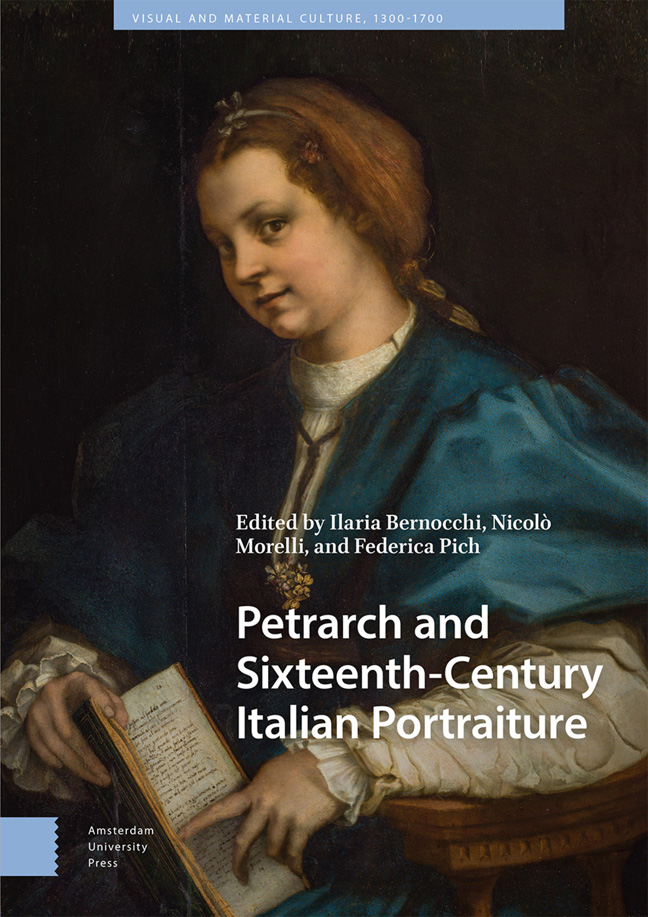Book contents
- Frontmatter
- Contents
- List of Illustrations
- Acknowledgements
- 1 Introduction
- 2 Widows, Poetry, and Portraits: Livia Spinola and Francesca Turina on the Portraits of their Dead Husbands
- 3 In Medusa's Eyes: Petrification and Marble Portraits in Late Sixteenth-Century Poetry
- 4 The Portrait of the Ideal Woman: Petrarch in Conduct Literature Texts for and about Women
- 5 Anti-Petrarchist Portraiture or a Different Petrarchist Portraiture?: A Literary Outlook on Some Non-Idealised Female Sitters in Renaissance Art
- 6 The Shadow of Petrarch: Benedetto Varchi and Agnolo Bronzino on Portraiture
- 7 Double Portraits of Petrarch and Laura in Print (c. 1544–1600)
- 8 Sonnet ‘Diptychs’ and Double Portraits: Figurative Allusions in Sixteenth-Century Encomiastic Poetry
- 9 Images of Women from Subject to Frame in Printed Portrait Books
- Bibliography
- Index
4 - The Portrait of the Ideal Woman: Petrarch in Conduct Literature Texts for and about Women
Published online by Cambridge University Press: 22 February 2024
- Frontmatter
- Contents
- List of Illustrations
- Acknowledgements
- 1 Introduction
- 2 Widows, Poetry, and Portraits: Livia Spinola and Francesca Turina on the Portraits of their Dead Husbands
- 3 In Medusa's Eyes: Petrification and Marble Portraits in Late Sixteenth-Century Poetry
- 4 The Portrait of the Ideal Woman: Petrarch in Conduct Literature Texts for and about Women
- 5 Anti-Petrarchist Portraiture or a Different Petrarchist Portraiture?: A Literary Outlook on Some Non-Idealised Female Sitters in Renaissance Art
- 6 The Shadow of Petrarch: Benedetto Varchi and Agnolo Bronzino on Portraiture
- 7 Double Portraits of Petrarch and Laura in Print (c. 1544–1600)
- 8 Sonnet ‘Diptychs’ and Double Portraits: Figurative Allusions in Sixteenth-Century Encomiastic Poetry
- 9 Images of Women from Subject to Frame in Printed Portrait Books
- Bibliography
- Index
Summary
Abstract
Between the sixteenth and seventeenth centuries, Petrarch's works in the Italian vernacular (not only his Canzoniere, but also his Triumphi) played an important role in the so-called conduct literature for and about women, that is, the rich production of treatises and dialogues aimed at both describing women's status and roles in society, and prescribing their duties and manners. While some moralists considered Petrarch's poetry an instrument of corruption of female morality, others made extensive use of Petrarch's lines in works addressing a female readership and offering practical advice on behaviour. This essay discusses Petrarch's contribution to the portrait of the ideal woman preserved in early modern conduct literature texts.
Keywords: Petrarch, conduct literature, women, description, prescription
Introduction
In his La nobiltà delle donne, first published in Venice in 1549 by Gabriele Giolito, Lodovico Domenichi (1515–1564) condemned ‘alcuni huomini tanto freddi et gelosi che non comportano che le donne loro scrivano o leggano cosa alcuna’ [those men who are so cold and possessive that do not want their women to write or read anything], and particularly those husbands who ‘hanno sospetto […] che se la moglie legge i sonetti del Petrarca, le novelle del Boccaccio o i romanzi dell’Ariosto, ella incontanente non perda la honestà sua et subito non si doni in preda agli amadori suoi’ [are afraid […] that their wives may suddenly lose their virtues and surrender to their admirers if they read Petrarch's sonnets, Boccaccio's short tales and Ariosto's romances]. This passage is a translation, from Latin into the Italian vernacular, of a sentence taken from the Ad commendationem sexus muliebris oratio by Girolamo Della Rovere (1530–1592), a text published in 1540, in which the catalogue of the readings prohibited to female readers also contained Jacopo Sannazaro's lyrics and Serafino Aquilano's poems. Both Della Rovere and Domenichi open their lists of ‘forbidden books’ with Petrarch, revealing how his sonnets were considered a means of corruption of female virtue and behaviour; this, however, is the point of view of ‘rozi et materiali ingegni’ [rough and ignorant minds], rather than the perspective of the two authors, who argued in favour of women's education and their access to different readings, Petrarch included.
- Type
- Chapter
- Information
- Petrarch and Sixteenth-Century Italian Portraiture , pp. 85 - 104Publisher: Amsterdam University PressPrint publication year: 2023



